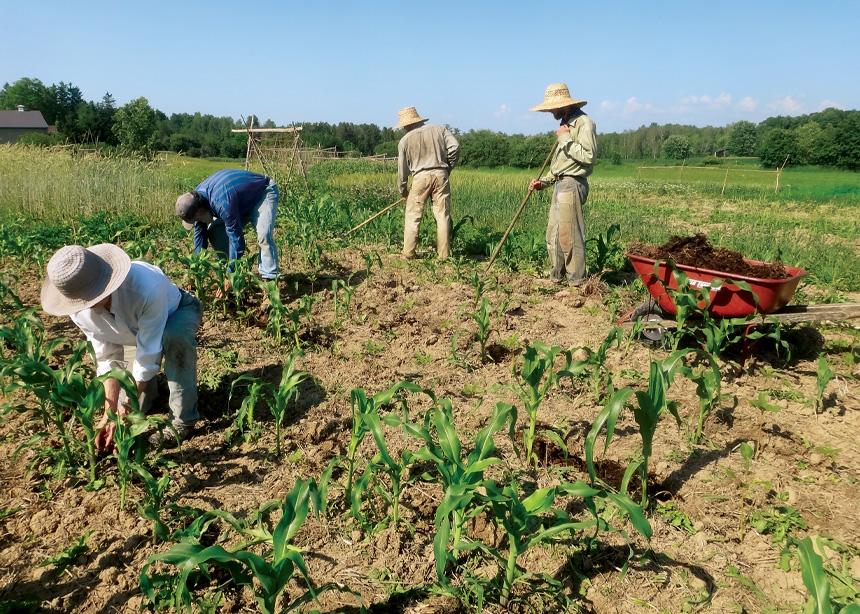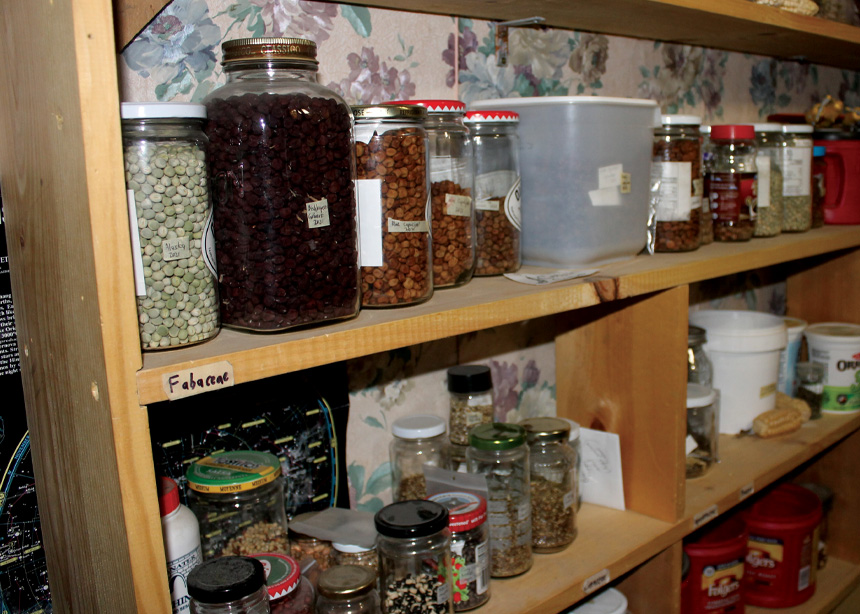“It’s nice to get to choose our humility,” my father reflected recently. Sometimes, however, we don’t get to. What do we do when we feel forced to be humble—what we often call humiliated?
Our dictionary says the words humble, humility, humiliate, human, homage and humus all share a common etymological root relating to earth and our species. Interesting.
Is being humbled or humiliated about us humans being pressed into the earth again? Is it about remembering that God originally formed us from the soil, and that we still come from soil and return to it?
I don’t like being humbled. Too often it hurts and leaves me vulnerable, aware of how much I can abruptly lose. Five years ago, I was just beginning to lead our family’s gardening effort. I had grand plans. We were going to grow far more crops, including a bunch we’d never tried before. It was our first season working with dry beans and dry corn, two crops that excite me. We tripled our garden area and planted everything.
Simultaneously, we were beginning to test our ability to use bicycles as a more serious form of transportation. Both were small ways I chose to humble myself.
I knew that my food and transportation depended on fossil fuels, and that fossil fuel extraction was harming people. Thanks in part to the coverage of pipeline issues in this magazine the year before, I felt that if I wanted to seriously engage in the discussion about fossil fuel use, I had to give up some of the enlargement of my life which fossil fuels were allowing. I had to humble myself.
So, I gardened and I biked. But on July 8 of that summer, my efforts toward humility were taken out of my hands.
After a visit and supper with friends 40 kilometres away, my brother and I left their house and headed our bikes down a hill in the cool summer evening. I shifted gears and abruptly threw the chain, which then jammed. I lost control, somersaulted off, landed on the back of my right shoulder and slid along the pavement. Not good for my T-shirt.
Our friends drove us to the hospital. My mother arrived (my father was baling hay), and they all sat with me in Emergency taking turns supporting my arm to ease the pain until eventually the doctor sedated me and treated my dislocated shoulder.
The whole thing was humiliating: the vehicle transport, my utter helplessness due to pain and the disposable plastics the medical team used. Going under the anaesthetic, my last thought was: “Look at all the resources your little effort to live righteously has wasted, Theo.”
I may tend to be a little hard on myself.
Over the following weeks of slow recovery and needing the help of others, I became acutely aware of how much I rely on community and on God to care for me and heal me. We get to choose only so far, and beyond that we are vulnerable, whether we like it or not. The shoulder still aches a couple times per week to remind me of my vulnerability, though I still have a stubborn tendency to forget.
While temporarily out of commission that summer, I read Carol Deppe’s book, The Resilient Gardener. In it, she talks about gardening for hard times, whether regional or personal hard times. In her writing about gardening (and life), she talks about choosing crops, practicing techniques and selecting seeds for resilience through these hard times. Since then, learning from her writing and others, our household has managed to substantially increase the share of our food which we grow, but we are by no means self-sufficient.
As Deppe says, “It isn’t normal, natural or healthy for us to be ‘independent.’ What is healthy is interdependence. [W]e don’t really seek true independence, but rather, enough knowledge and skills so that we can build and hold up our end of honorable interdependence.”
But what does that look like? A transformational understanding I received from Deppe was to see seeds as a focal point in honorable interdependence. On its own, a bean seed is not much. It needs a human to prepare a good place for it and press it into the ground at the right depth, time of year and distance from other plants.
It needs critters and pathogens to not demolish it prematurely. It needs enough rain and sun and moderate temperatures, and no untimely frosts. If it gets all of that, it produces roughly 40 seeds, which can repeat the process next year. Or be eaten.
To multiply from one to 40, the bean must go through the vulnerable time in the garden. A seed is sort of self-sufficient and stable, but the growing plant is in a web of interdependence with many others.
Thanks to Deppe and my dogmatism, I don’t water beans anymore, because that wouldn’t be selecting for drought resilience. Instead, I plant, worry, watch the forecast and pray that God will send rain (when God sees fit, of course, I usually remember to add—and preferably within 24 hours of seeding).
But this spring we had a stretch of extremely dry weather. Times like that help me appreciate what is at stake in Old Testament accounts of the people of God wavering between worship of God and worship of idols such as Baal. As I see it, the tension was between relying on God for a good harvest or making offerings to a fertility god in hopes of food security.
The more our harvests make up an increasing portion of our diet, the more I feel tension between relying on God and others, versus relying on my own efforts.
Our God, the one who wanted to be the sole God of the Israelites, wouldn’t promise earthly security. If the Old Testament Israelites stayed with God, it would involve a perpetual humbling of themselves—a recognition of interdependence.
The same goes for us. Now.
But I don’t think humbling has to be humiliation. It only is humiliation if we fool ourselves that we are independent. This world is too complex for that.
Instead, humility is to give homage to the one Creator of all, and to recognize the smallness of us creatures in comparison. We all have moments when we are pressed into the ground, whether it’s by a gardener’s careful hand or by the implacable power of gravity and the other forces that decide what happens when you come off a bicycle.
In those moments we can live out our interdependence, which I think is where the church, ideally, can show up at its best. In the end, we’re dependent on God, who doesn’t always show up in 24 hours or before we hit the pavement hard.
Rereading what I’ve written, I realize I have avoided a theological question: is God interdependent with us creatures? If so, what does that mean, especially when God showed up humbly walking around on this humus as a human with humanity?
I don’t know. I’ll need to think about that.
I do know that the beans came up beautifully. We shall see what happens next.









Leave a Reply
You must be logged in to post a comment.